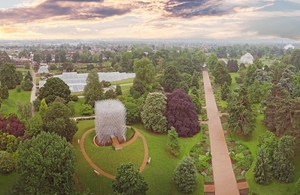Ministers appoint new Trustees to Kew board
Steve Almond, Kate Priestman and John Scanlon have all been appointed as Trustees of the Royal Botanic Gardens, Kew.

Defra Ministers have appointed three new Trustees of the Royal Botanic Gardens (RGB), Kew. Steve Almond, Kate Priestman and John Scanlon’s three-year terms commenced on 1 April 2022.
The appointments were made in accordance with the Governance Code on Public Appointments published by the Cabinet Office. All appointments are made on merit and political activity plays no part in the selection process.
Dame Amelia Fawcett, Chair of the Board of Trustees, said:
I am delighted to welcome Steve, Kate and John to the Board of Trustees. They all bring strong and diverse expertise and experience to the Board, and I very much look forward to working with them.
This is an important time for Kew, as we build on our highly impactful presence at COP26, deliver our ambitious Manifesto for Change and new Science Strategy and continue to play a major role globally in addressing the twin crises of climate change and biodiversity loss.
RBG Kew became an Executive Non-Departmental Public Body under the National Heritage Act 1983 with exempt charitable status and is sponsored by Defra. The Board of Trustees comprises a Chairman and 11 other members.
Biographical details of the new trustees
Steve Almond
- Steve is a Chartered Accountant and has worked in a variety of senior roles for Deloitte. He has a wealth of experience advising large company boards and audit committees. This includes 16 years on the Deloitte UK Executive, eight years on the Deloitte Global Executive and 10 years on the Board of Deloitte UK.
- In 2011, he was elected Chairman of Deloitte’s Global Board. In this role, he represented Deloitte on various external bodies, including Accounting for Sustainability Advisory Board, International Integrated Reporting Council, Social Progress Index Advisory Board and World Business Council Sustainable Development.
Kate Priestman
- Kate is currently Senior Vice-President of R&D Strategy and Portfolio at GlaxoSmithKline. She has worked in the biopharma industry for over 25 years, including at AstraZeneca and Eli Lilly, and has worked in roles across commercial, corporate governance, communications and government affairs.
- Kate has also worked for the BBC as a presenter and documentary-maker.
- Kate is a vocal ambassador and advocate for greater Equality, Diversity and Inclusion in STEM, and has been widely recognised for her impact in increasing ethnic representation, gender diversity and inclusivity.
- In her spare time Kate is an artist and creator and founder of a popular design blog. Her work inspired an installation in the Chicago Botanic Garden in 2016 and is used in schools as part of the creative arts curriculum.
John Scanlon
- John is currently CEO of the Elephant Protection Initiative Foundation, Chair of the Global Initiative to End Wildlife Crime and Chair of the UK Government Illegal Wildlife Trade Challenge Fund.
- He has a range of experience with environment and sustainable development policy, law, institutions and governance at the international, national and local level.
- John started his career in private legal practice, and went on to work in senior positions with Governments in Australia, with the International Union for Conservation of Nature (IUCN), United Nations Environment Programme (UNEP) and African Parks.
- John is also the former Secretary-General of Convention on International Trade in Endangered Species of Wild Fauna and Flora (CITES).
- John holds a Bachelor of Laws, and Master of Laws (Environmental), and in 2019 was awarded the prestigious Officer of the Order of Australia (AO) for distinguished service to wildlife conservation and protection through roles with international organizations.
About Royal Botanic Gardens, Kew
- The Royal Botanic Gardens, Kew is a world-famous scientific organisation, internationally respected for its outstanding collections as well as its scientific expertise in plant and fungal diversity, conservation and sustainable development in the UK and around the world.
- Kew Gardens is a major international and a top London visitor attraction. Kew Gardens’ 132 hectares of landscaped gardens, and Wakehurst, Kew’s wild botanic garden in Sussex, attract over 2.5 million visits every year. Kew Gardens was made a UNESCO World Heritage site in July 2003 and celebrated its 260th anniversary in 2019. Wakehurst is home to Kew’s Millennium Seed Bank, the largest wild plant seed bank in the world, as well as over 500 acres of designed landscapes, wild woodlands, ornamental gardens and a nature reserve.
- The Kew Madagascar Conservation Centre is Kew’s third research centre and only overseas office. RBG Kew receives approximately one third of its funding from Government through the Department for the Environment, Food and Rural Affairs (Defra) and research councils. Further funding needed to support RBG Kew’s vital work comes from donors, membership and commercial activity including ticket sales.
Notes
Trustees do not receive any direct remuneration for their services, although reasonable travel and subsistence expenses can be reimbursed. There is a requirement for appointees’ political activity (if significant) to be declared.
The appointees have declared that they have not taken part in any significant political activity in the past five years.
The new Trustees will join current RBG Kew Board of Trustees: Dame Amelia Fawcett, Sarah Flannigan, Jantiene Klein Roseboom, Krishnan Guru-Murthy, Professor Christopher Gilligan, Sir Paul Nurse, David Richardson, Judith Batchelar and Professor Ian Graham.
Defra and RBG Kew would like to record their gratitude for the outstanding services and commitment providing by the departing Trustees: Professor Liam Dolan, Catherine Dugmore and Professor Sue Hartley.